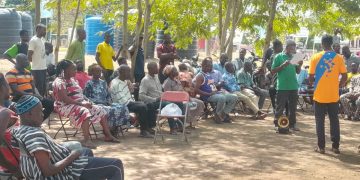In a thought-provoking message that continues to resonate with educators and policy makers alike, Professor Charles Marfo of Kwame Nkrumah University of Science and Technology (KNUST) made a bold declaration: “Any STEM and/or TVET education without indigenous systems, particularly language proficiency at the core of it, is bound to fail. At best, it’ll contribute less or nothing to the developmental blueprint a nation desires most.”
Professor Marfo’s statement was a call to rethink the approach to education in Ghana and across many African nations. He emphasized the critical role of indigenous languages in driving real progress, especially in technical and scientific education.
His message is clear without grounding STEM (Science, Technology, Engineering, and Mathematics) and TVET (Technical and Vocational Education and Training) programs in the local context, particularly in local languages, the chances of meaningful national development remain slim.
The Struggle with Colonial Legacies
The current educational system in many African countries is largely modeled on colonial frameworks. This system prioritizes Western languages, particularly English, as the primary medium of instruction. While English remains the global language of science and technology, Professor Marfo argues that it is not enough to foster the creative and critical thinking needed for local development.
“Yɛmfa adwene dada no ara nyɛ adefoforɔ. Mfaso papa biara mma so,” he lamented in Twi, a Ghanaian language, which translates to, “We cannot continue recycling old ideas. It brings no real benefits.” In this statement, he highlights the dangers of clinging to outdated or foreign models that have yet to bear fruit for African countries. The belief that imported systems, no matter how successful elsewhere, will automatically work in local contexts is deeply flawed, especially if they fail to integrate the local culture and language.
Indigenous Languages: The Missing Link
Professor Marfo’s argument is not merely about linguistic preference; it’s about relevance and ownership.
Indigenous languages serve as more than just communication tools; they are vessels of cultural knowledge, wisdom, and identity. When STEM and TVET education is disconnected from this foundation, it risks being perceived as foreign and inaccessible to many students.
The issue becomes particularly urgent in rural communities, where English proficiency can be limited, and students are often forced to learn complex scientific concepts in a language they barely understand. This creates a barrier to comprehension, innovation, and even interest in subjects that could otherwise transform their lives.
“How can we expect students to excel in subjects like engineering or technology when the language of instruction feels alien to them?” Professor Marfo asks. “We need to meet students where they are, and that starts with the languages they speak.”
Building Bridges to Development
Many countries, including Ghana, have ambitious goals for industrialization and technological advancement. However, the absence of local languages in STEM and TVET education threatens to derail these aspirations. When students learn in a language they understand deeply, they can better grasp concepts, ask questions, and, most importantly, innovate solutions that are tailored to their communities.
Some countries have already recognized this gap and are making strides to incorporate indigenous languages into their educational systems. In Ethiopia, for instance, efforts have been made to teach STEM subjects in Amharic, the local language. Similarly, in South Africa, a growing number of schools are introducing STEM courses in indigenous languages like Zulu and Xhosa. These moves have proven beneficial in fostering deeper understanding and engagement among students.
For Ghana, Professor Marfo suggests a similar approach. He envisions a future where scientific and vocational subjects are taught in local languages like Twi, Ga, Ewe, or Dagbani, alongside English. This, he believes, will not only improve comprehension but also encourage students to apply their knowledge in ways that make sense within their local contexts.
The Road Ahead
While the importance of English in the global context cannot be ignored, Professor Marfo insists that it should not come at the expense of indigenous languages. By integrating local languages into STEM and TVET education, African countries can create a new generation of scientists, engineers, and technicians who are rooted in their own cultures and able to contribute meaningfully to national development.
“We must stop borrowing and start building,” he says. “And that building begins with language—our own languages.”
Professor Marfo’s message is a clarion call to policymakers, educators, and the public to reimagine education in Ghana and beyond. By embracing indigenous systems, particularly language, Africa can begin to unlock its full potential, turning STEM and TVET into powerful tools for development that speak to the hearts and minds of its people.
Source: www.kumasimail.com/ IJB-Kumasi

































































